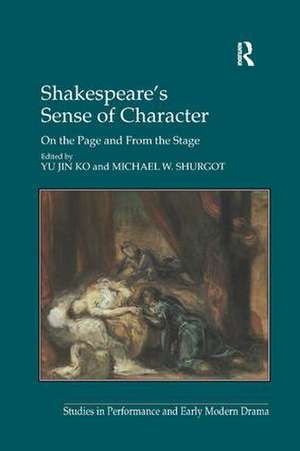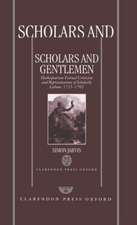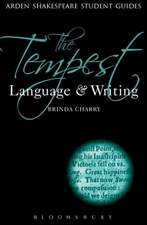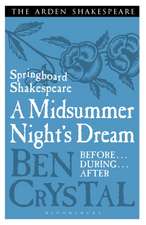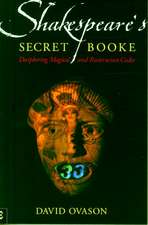Shakespeare's Sense of Character: On the Page and From the Stage
Autor Michael W. Shurgot Editat de Yu Jin Koen Limba Engleză Paperback – 15 noi 2016
| Toate formatele și edițiile | Preț | Express |
|---|---|---|
| Paperback (1) | 469.34 lei 6-8 săpt. | |
| Taylor & Francis – 15 noi 2016 | 469.34 lei 6-8 săpt. | |
| Hardback (1) | 1062.62 lei 6-8 săpt. | |
| Taylor & Francis – 18 dec 2012 | 1062.62 lei 6-8 săpt. |
Preț: 469.34 lei
Nou
Puncte Express: 704
Preț estimativ în valută:
89.82€ • 93.43$ • 74.15£
89.82€ • 93.43$ • 74.15£
Carte tipărită la comandă
Livrare economică 14-28 aprilie
Preluare comenzi: 021 569.72.76
Specificații
ISBN-13: 9781138261730
ISBN-10: 1138261734
Pagini: 280
Dimensiuni: 156 x 234 mm
Greutate: 0.45 kg
Ediția:1
Editura: Taylor & Francis
Colecția Routledge
Locul publicării:Oxford, United Kingdom
ISBN-10: 1138261734
Pagini: 280
Dimensiuni: 156 x 234 mm
Greutate: 0.45 kg
Ediția:1
Editura: Taylor & Francis
Colecția Routledge
Locul publicării:Oxford, United Kingdom
Notă biografică
Yu Jin Ko, is Professor of English at Wellesley College, USA. Michael W. Shurgot is Professor of Humanities at South Puget Sound Community College, USA.
Recenzii
'One of the collection’s strongest features is its organization [...] which makes the collection feel like a unified whole, a rarity in books of essays. Particularly effective is the ’conversation’ between Cary Mazer and Tiffany Stern in their respective pieces concerning historicizing spontaneity... Summing Up: Recommended. Graduate students, researchers, professionals.' Choice 'The book offers a series of different perspectives on the complex relationships, between two of Shakespeare’s most compelling characters.' The Shakespeare Blog ’Investigating the relationship between actor and character, between actor and audience, and between characters in plays, these essays speak to one another in interesting ways and engage in an ongoing conversation about Shakespearean character that marries theory with theater practice. The collection will be of interest to Shakespeare critics, scholars of performance criticism, and theater professionals.’ RQ Winter 'The virtues of this volume are many ... This dialogue is not serendipitous, but a result of editorial care. The essays also demonstrate that academic prose can be smart, stimulating, and pleasurable; that scholarly debates can be passionate but civil; and above all, that character-based approaches are integral to our engagement with Shakespearean selves in a postmodern world.' 16th Century Journal
Cuprins
Introduction, Yu Jin Ko; Part 1 Shakespearean Persons; Chapter 1 How Dark Was It in That Room? Performing a Scene Shakespeare Never Wrote, Michael Bristol; Chapter 2 Shakespearean Characters and Early Modern Subjectivity: The Case of King Lear, Bruce W. Young; Chapter 3 What Makes Someone a Character in Shakespeare?, William Flesch; Chapter 4 Wopsle’s Revenge, or, Reading Hamlet as Character in Great Expectations 1 Special thanks to Mark Bayer and Gretchen Minton, the directors of the 2006 Shakespeare Association of America seminar on “Shakespeare’s Literary Afterlives” for providing an occasion for the original draft of this essay and for their subsequent suggestions. Thanks also to Yu Jin Ko, Edward Tayler, and Martha Woodruff for offering encouragement and suggestions., James E. Berg; Part 2 Character in Action; Chapter 5 Historicizing Spontaneity: The Illusion of the First Time of “The Illusion of the First Time”, Cary M. Mazer; Chapter 6 (Re:)Historicizing Spontaneity: Original Practices, Stanislavski, and Characterization, Tiffany Stern; Chapter 7 Retracing Antonio: In Search of the Merchant of Venice, Diego Arciniegas; Chapter 8 Letting Unpleasantness Lie: Counter-Intuition and Character in The Merchant of Venice, Brett Gamboa; Chapter 9 Iago: In Following Him I Follow But Myself, Dan Donohue; Chapter 10 “I lay with Cassio lately”: Iago’s Fantasy, the Actor and Audience Response to Othello in 3.3, Shurgot Michael W.; Part 3 Beyond Naturalism: Then and Now; Chapter 11 Just Do It: Theory and Practice in Acting, Eunice Roberts; Chapter 12 Playing Sodomites: Gender and Protean Character in As You Like It, Lina Perkins Wilder; Chapter 13 “Stops” in the Name of Love: Playing Typological Iago, Travis Curtright; Chapter 14 Henry V ’s Character Conflict, James Wells;
Descriere
Making a unique intervention in an incipient but powerful resurgence of academic interest in character-based approaches to Shakespeare, this book brings scholars and theatre practitioners together to rethink why and how character continues to matter. Contributors seek in particular to expand our notions of what Shakespearean character is, and to extend the range of critical vocabularies that character criticism can work in.
